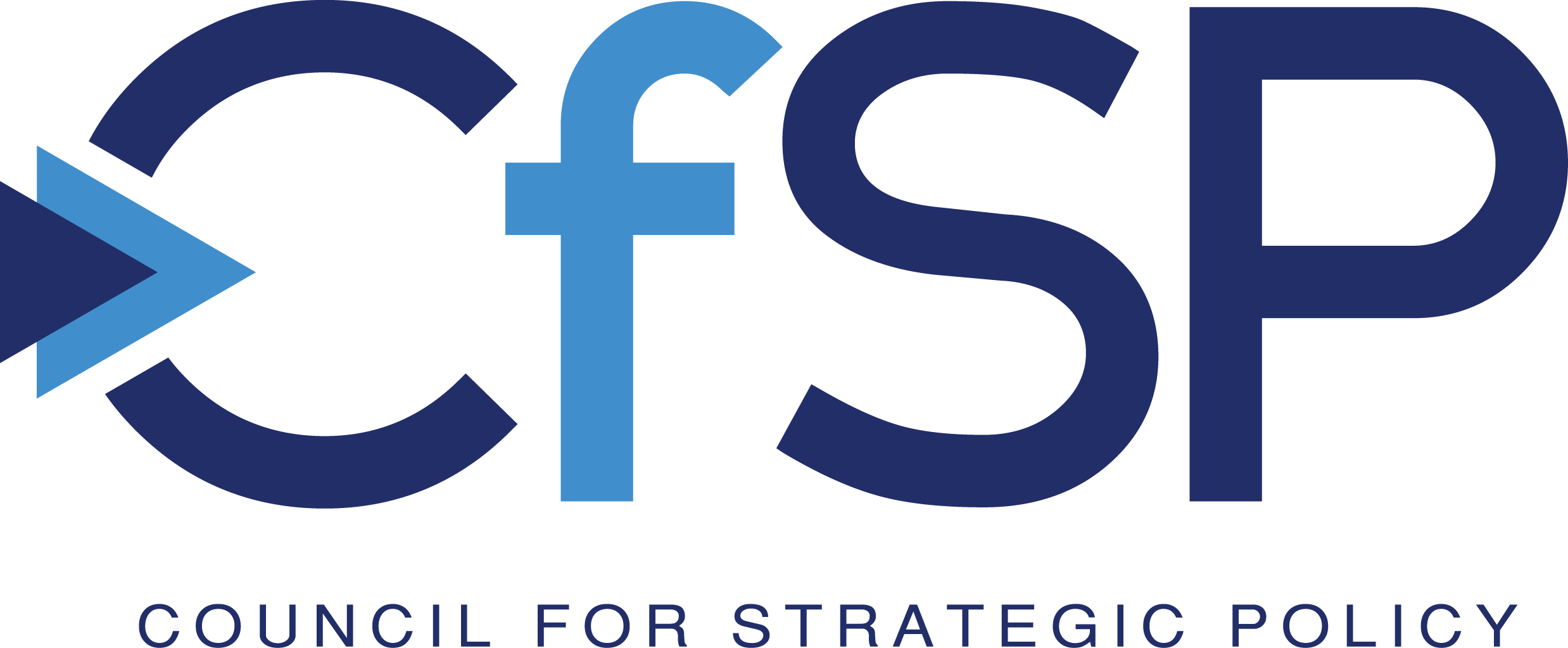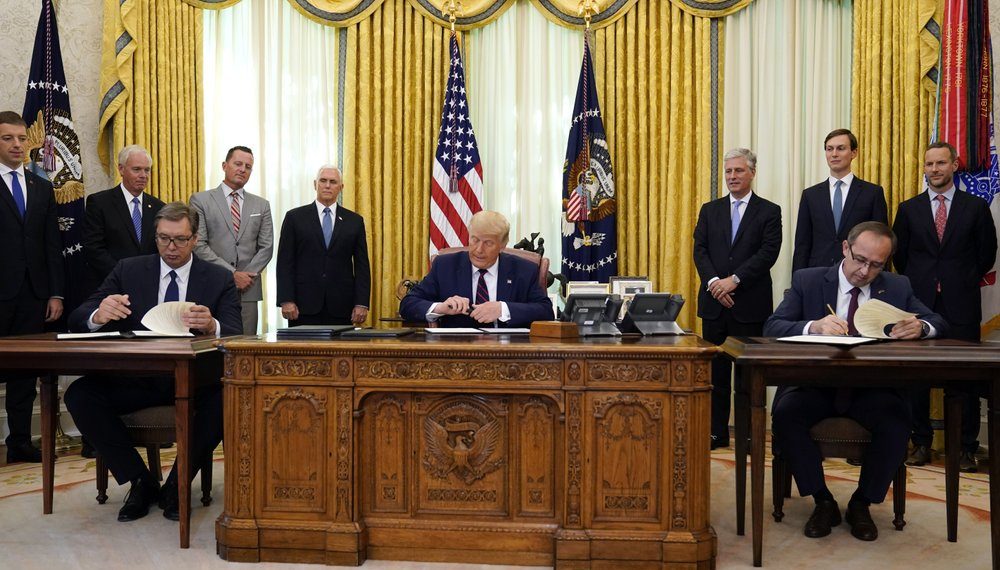Author: Dragan Šutanovac, President of the Council for Strategic Policy
Over twenty years after the war conflict, thirteen years after the self-proclamation of Kosovo and Metohija independence and after the Brussels Agreement, Serbia signed an agreement in the White House with only one signature and guarantees fulfilment of everything written in the document made by the US President.
Although many expected that at least a hint of mutual recognition of Belgrade and Priština would be on the White House agenda, that did not happen. The public was only informed that there was a wish of the hosts that by signing the agreement, practically both parties would commit themselves to mutual recognition in the future.
After several weeks, we can now, with a cool head, analyze the agreement that many will say that President Trump “stole the show” in his manner and transferred our “small” and to most Americans completely unclear quarrels to the global political field, unexpectedly including the Middle East.
Given that the official host of the meeting was the president’s national security adviser, Robert O’Brien, and that the meetings took place in the National Security Council (NSC), it could be expected that in addition to economic topics, political ones would also be initiated. And just as President Trump managed to pull the United States out of numerous conflicts around the world, and at the same time get stuck in the conflicts of the divided American society, the economic part of the Washington agreement remained in the shadow of the big game currently being played in the Middle East.
And that a great game is being played in the Middle East and that historical changes are taking place in the attitude of the Arab world towards Israel could be easily inferred from the agreements recently signed by the United Arab Emirates and Israel under the patronage of Washington. If this agreement was viewed as a solitary example, after the agreement signed by the delegations of Serbia and Kosovo, it is completely clear that the current White House administration is extremely careful in preparing and eventually approaching implementation. Thanks to the aggressive Iranian influence in the region, the attitude of some Arab countries towards Israel is definitely changing. A new agreement of Bahrain followed as well as the permission of Saudi Arabia to the Israeli airline to fly over that Gulf country, and similar agreements with Oman and Sudan can be expected in the following period. It seems that, by chance, both Belgrade and Priština found themselves in a situation to participate in an efficient diplomatic action carried out by President Trump’s team.
The decision for Serbia to move its embassy to Jerusalem, as well as to declare the military and political wing of Hezbollah a terrorist organization, is an unexpected result of the meetings, which should have focused mainly on the bilateral agreement within the scope of economic cooperation. It is not easy to explain why that part of the agreement was actually a ticket to the Oval Office, especially since Serbia is not influential in that part of the world and Kosovo even less so. However, President Trump’s administration apparently estimated that the relocation of the Serbian embassy with mutual recognition and the opening of an embassy in Jerusalem by the “Muslim state” of Kosovo would be an obvious signal to both Israel and the influential Jewish voter population in the United States that the Middle East problems were in a process of solving with no intention to stop. To tell the truth, the reaction of the Prime Minister of Israel Netanyahu was euphoric, primarily because of Kosovo. We have already seen how much that part of the agreement can cost Serbia; Israel recognized Kosovo, but what price Kosovo will pay, having in mind that most countries of the Islamic Conference recognized Kosovo and that there are some indications of withdrawal of recognition, is yet to be seen.
Did Serbia really put to danger its security by declaring both Hezbollah military and political wing a terrorist organization? I try to understand those who claim that it was and that would cause terrorist activities against Serbia, but if that thesis is correct, then it is certain that the political part together with the military wing of Hezbollah is essentially a terrorist organization and nothing else.
While society in the United States is polarizing, even to the level of physical conflicts, and while Democrats focus their power mainly on criticism, Trump is dedicated and presents himself as a man of solutions, but also as a grateful partner. There is no doubt that by the first week of November, Trump will prepare more surprises that will be interesting not only to American voters, but also to the international community.
And did Serbia solve at least a small part of the accumulated problems in the Oval Office, or did it only serve President Trump in his campaign? Of course, every agreement is subject to criticism, but the role of a spectator is much more grateful than the role of a chess player who sits at a table and bears the consequences of his moves. However, to conclude, Serbia signed an agreement that is certainly better than a no-agreement.
Let’s follow the order; although last year Serbia signed an obligation to participate in the construction of the Niš – Priština highway, to open a Belgrade – Priština airline route, as well as to invest in better railway infrastructure, all three items were included in the newly signed agreement, but this time with a much stronger guarantee, and in the presence of the President of the United States. When the news that Serbia would participate in the construction of the Belgrade – Priština highway, during the election campaign for the presidency of Serbia appeared, one of the candidates was emotional and convinced that it was necessary to strengthen the pre-election national rhetoric, and he said in Niš that Vučić planned to build a highway that would take Albanians from Kosovo to Niš to buy real estate. There was a paradox observed – many tourist destinations were closed due to the pandemic, so many Serbs used the existing road Niš – Priština to go on vacation to Albania.
Yes, the road Niš – Priština has been existing for more than half a century, but it is unconditional and only because of the events in the late 90’s, the road is unencumbered, which does not mean that it will remain so when Kosovo joins the Mini Schengen zone, which is one of the signed points of the agreement. After all, Kuršumlija, Prokuplje, Žitorađa and even Blace are finally connected with the traffic backbone of Serbia and that is good news for everyone in the region. That the decision to build is definite is proved by the fact that the state is largely buying the land on the future route of the highway, with the approval of Toplica citizens, who may have been the first to benefit from the agreement, considering that these days sums of money they could only dream of are being paid. So, even before the construction started, highway “Mir” brought a certain benefit to the locals whose land was on the route.
Probably the most important part of the economic agreement is the so-called Mini Schengen, which Kosovo and Montenegro resisted, each for its own reasons. With the signed agreement in the White House, but also with the post-election changes in Montenegro, it is to be expected that the 2019 initiative will be completed and that in addition to Serbia, Albania, Northern Macedonia and Kosovo, will be joined by Podgorica, which opens serious prospects for economic development, above all our economy. Free movement of people, capital, goods and services is the basic postulate of the EU, and therefore it is hardly a problem for anyone in the Western Balkans.
According to the signed agreement, Serbia is obliged to work with the countries that criminalize the LGBT population on its decriminalization. One gets the impression that this is an indisputable point of the agreement, considering that no one or almost no one in public attacked that point, which is proof that our society is also changing, this time for the better.
A significant issue in the relations between Belgrade and Priština also referred to Lake Gazivode, being the most important water intake for a large part of Kosovo, and without which the Obilić thermal power plant would not be able to function jeopardizing the electricity supply of many consumers in Kosovo. The introduction of a third party, in this case experts from the US Department of Energy, and the preparation of an expert feasibility study gives hope that this issue will be resolved in a mutually acceptable way, or that we will at least get a study on which to base our amendments.
Finally, the biggest storm has been caused by the decision that Serbia would not buy 5G telecommunication systems from unreliable suppliers, as well as that it would diversify its energy supplies. I belong to those who believe that these points have no place in the agreement, and not because they spoil relations with China and Russia, but because these items need to be incorporated into the National Security Strategy, given that the 5G network and energy is an important factor within the area of security regarding our country. Of course, no one is naive as much as not to understand the context, but on the other hand, can anyone politically responsible support the purchase of unsafe equipment and should Serbia depend on the monopoly of only one energy supplier?
So much has already been said and written about the seating arrangement, chair size, small tables, pen, Zakharova’s tweet and other “extremely important” accompanying details of the whole event that there is no need to add anything.
There is no doubt that much more will be written and talked about the agreement, but one thing is certain, in the week following the signing this agreement in Washington, one gets the impression that Brussels has broken out of lethargy and that Lajčak wants the negotiations back under EU auspices. Seven years after the signing of the Brussels Agreement, the formation of the Union of Serbian Municipalities (ZSO) was discussed again, which was signed and guaranteed in Brussels, and nothing has been done about it yet. Obviously, Trump’s agility also gave impetus to the EU administration, which at this moment would be extremely important to impose itself as a credible moderator in unravelling the Serbian-Albanian Gordian knot.
Source: Novi Magazin”

